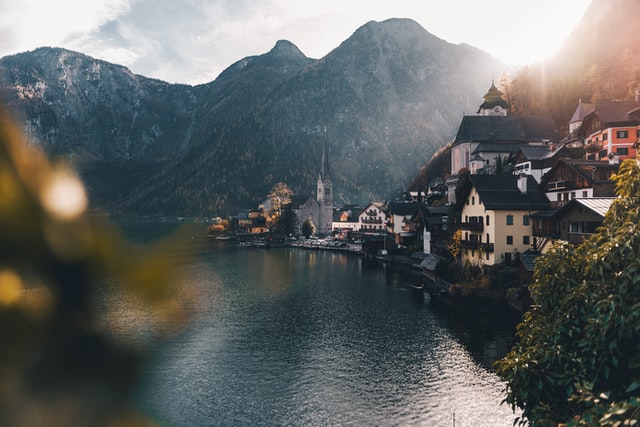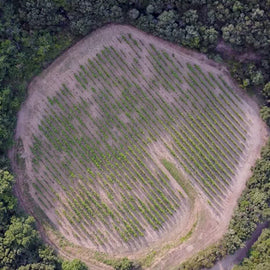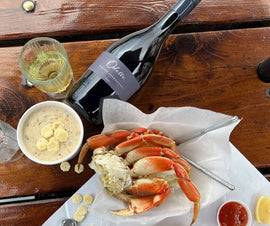“Austria is a beautiful European country famous for its immense history, rich culture and stunning geography that enchants locals and tourists worldwide. Though many vino newbies don’t think of Austria as a bountiful wine-producing country, this could not be further from the truth. Like the rest of its unique culture, Austrian wine has ancient roots extending throughout the country. In 700 BC The Celts were already farming the native vines in a somewhat simple form of viticulture. This Celtic influence was monumental, but it would take a few centuries for winemaking to truly take off in the region. Around 1 BC, modern-day Austria was under Roman control, and with that came the systemized and massively scaled style of Roman wine production. For the next few centuries, the region became a home for wine in Central Europe.
Following the demise of the Roman empire, the wine industry in Austria experienced a great deal of change. Under new leaders, vineyards were reconstructed and new grapes rose in popularity. Over the following centuries, these changes led to a boom of Austrian wine that transformed Vienna into a world wine center in the 14th century. However, in the 19th century Austria was bombarded by hazardous vineyard mildew and the infamous wave of phylloxera, an insect that feeds on grapevines, many vineyards disappeared by 1872. These setbacks dealt a significant blow to wine in Austria, and it would take decades to recover.
The boom of wine production in the early 20th century led to the industrialization of Austrian wine, supposed drops in quality and myriad controversies. Chief among these was the “antifreeze scandal” in the 1980s, in which some winemakers in Austria added diethylene glycol, a chemical found in antifreeze, to wines for enhanced sweetness and body. This controversy harmed the reputation of Austrian wine for a period, but it also led to favorable, sweeping regulations that initiated a national focus on quality over quantity at vineyards. These changes spurred the creation of the Austrian appellation system, the DAC, and helped Austria regain its place as one of the world’s top 20 wine-producing countries in recent years.” - Wine Insider
Just a few miles west of the great shallow lake called the Neusiedlersee (literally, “the new settler lake”) is the town of St. Margarethen and the winery Rosi Schuster. Their nine hectares of vines spread themselves out among the finest and oldest vineyards in the communities of St Margarethen and Zagersdorf. Certified organic, they produce some of the most distinctive and expressive wines in Austria. Since 2015, they’ve made Rosi Schuster Aus Den Dorfern, a Gruner Veltliner with a healthy shot of Gemischter Satz, meaning more than a dozen of esoteric varieties, some of which we had never before heard of. “Aus Den Dorfen” means “from the villages”, specifically estate holdings in Sankt Margarethen, Rust and Zagersdorf. The Aus Den Dorfen wines are eminently and immediately drinkable wines from a fantastic young winemaker.
At Weingut Michael Auer, they describe the ideal typical wine from Carnuntum as such; "It has to be authentic, reflect the characteristics of the grape variety and the region, have backbone, but also drinkability - coherent, balanced, harmonious.” When working in the vineyard and in the wine cellar, Michael Auer follows equally clear lines: his wines are created in harmony with nature, but not by chance. The harvest is entirely handpicked. In the cellar, the motto is "controlled idleness": The wines are left on the skins for a maximum of 20 days. For several years, the vintner has been using whole cluster fermentation, since the intercellular process makes the wines particularly soft and harmonious. Michael Auer is no longer a young vintner who experiments a lot or who has to find his way. He knows exactly what he wants and how to reach his goals. It is exactly this vision and consistency that can be felt and tasted in his wines.
Cheers,
The PlumpJack Wine Team
|
Rosi Schuster Aus Den Dorfern Gruner Veltliner/Gemischter Satz 2020 |
|
|
Region / Country of Origin: Burgenland, Austria |
About the winemakers: Rosi Schuster’s son Hannes started making wine in 2000 while he was still in college - bottling a cuvée of Chardonnay and one of Sankt Laurent. When his father fell ill in 2005, Hannes decided to return back full-time to my family estate and work alongside his parents. After his father passed away in 2007 his mother Rosi passed on the running of the estate to Hannes. They gradually converted the vineyards to organic. About the Winemaking: 90% Gruner Veltliner 10% an even blend of Welschriesling, Muskat Ottonel, Weissburgunder, Neuburger & Furmint from his organically farmed vyds surrounding Ruster Berg. Grown on gneiss, schist, limestone and sand. They minimize the impact of oak and chose to only work with spontaneous fermentation and long lees aging in used Stockinger barrels. Hand harvested. Spontaneous fermentation, 65% is aged in stainless tanks and 35% is aged in large, used barrels, and both are aged 9 months. Tasting Notes: pours a pale yellow with flecks of silver and green. The nose isn’t flashy, but it is certainly confident and intricate: the combination of ripe orchard fruits like yellow apple and quince with faint white stone fruit calls Burgundy to mind. But there’s a gentle herbaceousness here too—some chervil and baby arugula—and a soft leesy note running through a vein of serious salty minerality that highlights Grüner’s individual charm. The palate is medium-bodied, fresh, and ripe with beautifully integrated acidity. Everything here is perfectly in place: “balance” and “complete” are two words that kept coming to mind. |
|
Winemaker: Hannes Schuster |
|
|
Price: $25 bottle/$270 case |
|
|
Suggested Food Pairing: Salads Sushi Roast Chicken Pork Schnitzel with dill sauce |
|
|
Weingut Michael Auer Blaufränkisch 2019 |
|
|
Region / Country of Origin: Höflein, Austria |
About the Winery: This winery began with Michael’s grandfather, who ran a mixed agricultural enterprise in Höflein, with three hectares of vineyards. Including a row of Syrah vines in the vineyard site Kirchtal, which is probably one of the oldest parcels of Syrah planted in Austrian soil. However, his grandfather still marketed the entire production exclusively as cask wine. Today, Michael and his wife Carina cultivate more than twelve hectares of Welschriesling, Chardonnay, Zweigelt, Syrah, Pinot Noir and Blaufränkisch in and around the village of Höflein. With their new construction in 2017, the estate has at last definitely outgrown the label ‘garage winery’. About the winemaking: In both the vineyard and the cellar, Michael Auer follows a steadfast approach, working hand-in-hand with nature and relying on whole cluster fermentation in the ultimate pursuit of balance. Michael Auer knows what he wants, and how he intends to get there. Precisely this dedicated vision and consistency can be sensed and tasted in his wines. Tasting Notes: Dark ruby garnet, violet reflections, delicate lightening of the edges. Fine cherry fruit, underlaid with delicate red wild berry confit, a hint of herbs, citrus zest. Medium body, fine blackberry fruit, delicately spicy tannins, peppery touch on the finish, already accessible, mineral finish. |
|
Winemaker: Michael Auer |
|
|
Price: $25 bottle/$270 case |
|
|
Suggested Food Pairing: Schnitzel red cabbage borscht bratwurst spaetzle |
|





